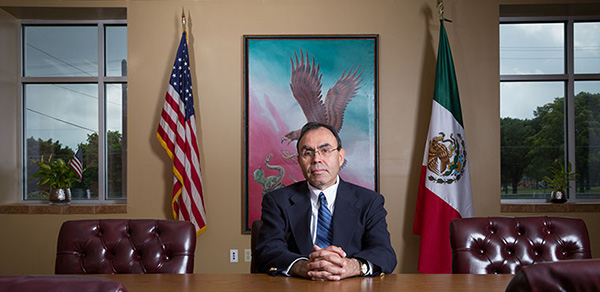
Mexico could soon establish a consulate in Milwaukee to serve the region’s growing Hispanic population.
The push for a consulate has been led in part by UWM educational anthropologist Javier Tapia, whose work on globalization and political, economic, and social issues affecting the U.S. and Mexico led him to realize the over-worked and backlogged Chicago consular office couldn’t adequately serve the Milwaukee community. Tapia, who helped create a consulate task force in 2013, recently spoke about his efforts.
Why is it important to have a Mexican consulate in Milwaukee?
Wisconsin’s Hispanic population has increased dramatically in the last 20 years, and residents of Mexican origin make up 74 percent of that population. The consular offices in Chicago cover Mexican residents in Illinois, Wisconsin and northern Indiana. However, due to the population growth in Wisconsin, they are not able to meet all the needs of those seeking help. Bringing a consulate to Milwaukee will improve access to the services needed by the Mexican population.
What are some of the issues a consulate can help with?
The consulate office will have three major objectives. It will provide services to the growing Mexican population. It will facilitate economic trade between Wisconsin and Mexico, and it will serve as a conduit to support educational and health initiatives between Wisconsin and Mexico.
For individuals, the consulate will be able to provide Mexican identification cards, Mexican passports, birth certificates and automobile permits. Also, in the case that there is a death in a Mexican family, they may assist the family in sending the body back to their hometown of origin.
Mexico is Wisconsin’s second largest trading partner. As such, the consulate can provide businesses and corporations with information to identify markets for their products as well as facilitate the process for conducting business in Mexico.
The Milwaukee office will facilitate partnerships between institutions of higher education in Wisconsin and Mexico. Along with faculty and student exchanges, some programs can be structured to better meet the education and health needs of the Mexican community.
How long have you and others been working on this?
We created a Mexican consular task force for Wisconsin in August 2013. However, the efforts to establish a Mexican consular office here date back to the 1970’s. The other members of the task force are Ernesto Baca, Teresa Mercado and Gregorio Montoto, who are affiliated with Mexican Fiesta and the Wisconsin Hispanic Scholarship Foundation; Ivan Gamboa, vice president of Tri City National Bank; Nancy Hernadez, president of ABRAZO Multicultural Marketing & Communication; and Tammy Olivas and Zeus Rodriguez, of Hispanics for School Choice.
What has the task force done?
Members met with Gov. Scott Walker’s office, and he has been very supportive. He wrote two letters to the president of Mexico Peña Nieto and Ambassador Medina Mora in 2013 and 2014. The task force’s work for a consular office in Milwaukee has bipartisan support from members of the U.S Congress. This effort has been led by Congressman Sean Duffy and Senator Ron Johnson. Members of their staff Camille Solberg and Robert Hamill have been key in this effort.
The strong support from Governor Walker and the U.S. members of congress from Wisconsin were key in moving Wisconsin to the top of the list. Before their intervention Wisconsin was not in the running for a consulate.
The task force has also met with Mexican government officials in Milwaukee, Chicago, and Washington D.C. Key Mexican officials in these negotiations have been Undersecretary Sergio Alcocer, Consul Jimenez Macias, and Deputy Consul Agustin Rodriguez.
How did your work in globalization and educational policy influence your push for a consulate here in Milwaukee?
Globalization, the economic interdependence between Mexico and Wisconsin, and the growth in the Mexican population are components of the same phenomenon. As such, it is important for universities to develop educational programs that will provide professionals and students with the knowledge and skills to work in the two countries and better meet the needs of the Mexican community in Wisconsin. This vision is rooted in my previous work with Guanajuato, Mexico back in 2001. Through this work, I came into contact with community organizations in Wisconsin and with U.S. and Mexican government officials. As we move forward into the future, academic work has to have more practical applications to better meet the needs of society. My push for the consulate office in Milwaukee is part of this trend.
Do you think having a Mexican consulate here will open the door for consulates from other Latin American nations?
I think it could serve as a blueprint. Mexican consular offices in the United States often collaborate with consular offices from other Latin American countries. And in some cases in California, people from El Salvador, Guatemala, and others have had access to education and health services from a Mexican consular office.






